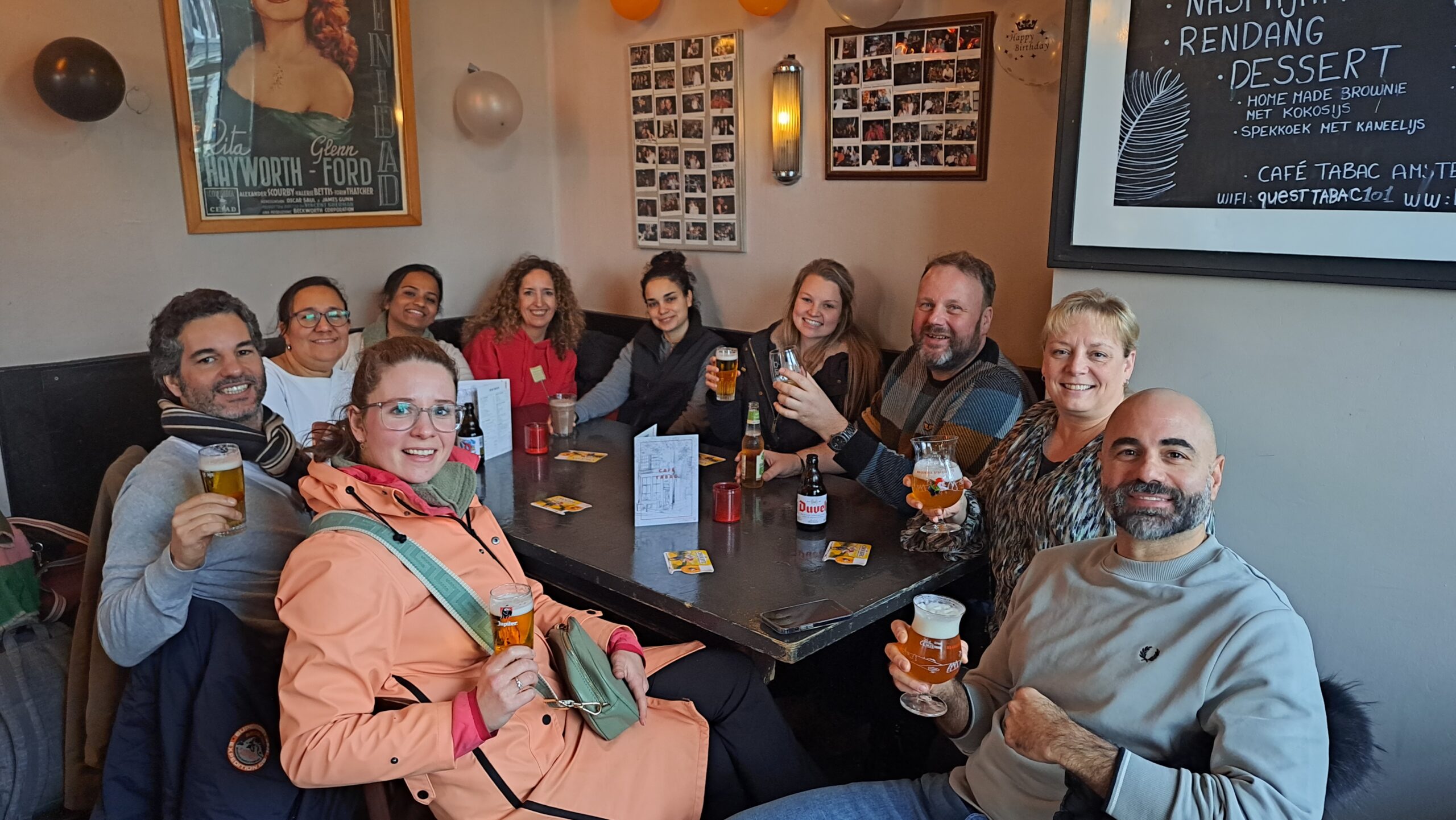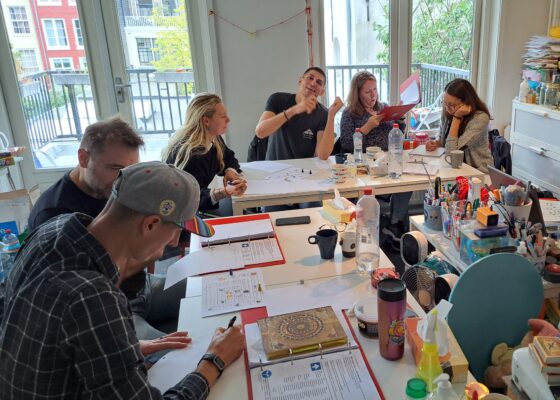Partner content
A man and his method: Behind the Brainwash system to learn Dutch

There are several ways to go about learning Dutch.
There are the traditional language courses and university classes. Private tutors. An endless number of online courses and apps. There are even the “Nuns of Vught”, who for decades were the go-to Dutch language teachers of royalty (think queen Maxima when she was still a princess) and commoners alike who were echt serious about learning the language.
But many of the traditional routes don’t always stick, and the nuns (who aren’t even nuns anymore), will set you back thousands of euro for their intensive course.
Fifty-one-year-old Natalia Ferrer, a software engineer manager from Barcelona, had tried many of them. She moved to The Hague with her husband and two children for what they thought would be two years. Now, eight years later, they call the Netherlands home. And for the language-loving Natalia, that meant a serious deep dive into learning Dutch.
“I had started taking lessons one year after I arrived at a Dutch language academy so I could understand the letters I received in the mail and messages in the gym and on the train,” she says. “But it wasn’t a great experience. We followed a book. It was difficult to understand, and because the teachers had to keep pace and follow a study plan, they couldn’t stop to explain.”
She stuck with it for a year or two, but eventually called it quits. “I didn’t feel like I was learning,” she recalls. “It left me with more doubts than I came in with.”
During and after Covid, she picked Dutch up again online with a group of Spanish-speaking, Dutch language teachers living in South America, which was enough to raise her level of understanding but still left her tongue-tied when it came to speaking. After a recent job offer in Dutch left her panicked, she looked for an intensive course.
Mr. Dutch Brainwash
Enter Albert Both, founder and sole teacher at Talencoach, who offers intensive one-week Dutch courses based on his own “brainwash” method. Part comedian, part therapist, part event planner and part language facilitator, Albert (aka Mr. Dutch Brainwash) has “brainwashed” hundreds of students since setting up shop in his informal classroom on Amsterdam’s Keizersgracht in 2009.
“We’re unique,” he says of his maximum 8-person classes. “We sit around a table like a group of friends. My students inspire each other to learn. We create a safe and fun atmosphere, as compared to their past traumatic experiences learning Dutch, which were often impersonal and had students sitting there like they were in a factory. I just want people to talk, which is what they also want.”

And talk they do, which is the main goal of Albert’s conversational classes. He has a talent for making people feel at ease. “If you’re not at ease, you won’t feel good,” he says. “People already feel guilty or lazy and think they should speak better Dutch. But via interactions, people start believing they can do it and move forward. It’s a very personal and refreshing approach, centred on confidence-building, not memorizing.”
To nudge his students into speaking, Albert mixes a blend of highly unorthodox methods that he formulated and has perfected over the past two decades, including throwing in words from different languages such as French and Spanish to help people learn Dutch. “It’s a very simple trick that no one uses,” says Albert. “I use French words in Dutch that are more familiar. And familiar Dutch words like positief and negatief. It’s easier for people to learn if they hear something familiar.”
He also focuses the conversations on subjects people are interested in. “We talk about sex, sex and sex,” he says. “People laugh and feel more relaxed. They can talk about their experiences. They help each other out, offering parental advice and romance tips. An interaction is taking place, as compared to just talking about the weather.”
No subject is off limits, which is why Albert doesn’t encourage people younger than 19 to take his classes. “I’m not impressed with their attention spans,” he says of some young people he’s worked with. “It’s a myth that they learn languages quicker. You need an ability to focus.”
Emotional triggers
By emotionally triggering his students, says Albert, they’re engaged, invested and learn quicker. “Usually language classes are formal,” he says. “But you must talk about things that matter, that have an effect on your life.”
To be sure, Albert does address vocabulary and grammar, but it’s all about keeping the conversation flowing. By keeping things light and entertaining, he says, “students start talking and experimenting. They see what works and what doesn’t.”
Mistakes
And it’s this willingness to make mistakes that is crucial to learning a language. “People go for perfect, but you must explore,” he says. “Don’t be 100% sure. With a language, you must take risks. If you do, you’ll move forward, guaranteed.”
“The best thing I learned in Albert’s course is to accept I’ll make mistakes all the time,” says Natalia of her newfound confidence. She took Albert’s Dutch Brainwash course just last month. “He said making mistakes means you’re learning. It was psychological. And it was eye-opening. Now I’ve lost my fear and feel empowered to speak.”
The only thing Albert demands of his students is that they have the desire to learn and speak Dutch. “If you want to prove you can’t do it, you’ll win,” he says of sceptics. “I can’t give you Dutch, but I can facilitate your journey and guide you, help you shift how you feel about the language. Great things will happen.”
Accidental teacher
That this guy who hated Dutch grammar in school developed a fun and successful teaching method is something of a wonder, even to Albert. “I honestly don’t know how I do it,” he says. “If someone told me 20 years ago I’d be teaching Dutch, I’d say no way.”
Offering a unique combination of humour and humanity, his method also includes lots of visuals, from stuffed animals to food, pictures to videos. He lumps all levels of Dutch speakers together, which he says actually works, and he treats all like the adults they are. “People are already operating at a high level,” he says. “You must meet them where they are—intelligent and playful. They’re not babies. Teachers and students need to be equals.”
That helps when it comes to teaching the tricky Dutch grammar. “You can’t learn what you don’t understand,” says Albert. “We build up sentence structure step-by-step. It’s difficult, but it is logical and can be explained. And if I make a game out of it, people will learn it.”
Long words
We’ve all come across those 35-letter Dutch compound words (meervoudigepersoonlijkheidsstoornis, or multiple personality disorder, anybody?), but Albert explains why those words actually belong together.
“He explains word-building,” says Natalia. “I have no doubts at all now, like when you use lekker or lekkere,” says Natalia of mastering the basics. “The fundamentals are settled. Albert solved all those problems. Now I just need to practice.”
Which is where she says another crucial Albert tip comes in: “Don’t talk only when you need to,” she says he advised them. “That’s what I did. Now I look for more opportunities to speak Dutch—in the gym, with friends. It’s a great tip!”
Natalia recently started listening to Dutch podcasts and watches streaming services in Dutch. She’s even reading a Dutch book. “Everything is crystal clear,” she says. “Albert’s method is great and totally different, but it’s also him. I wish I could have met Albert earlier. I suffered a lot. With Albert, you’ll learn in a week what took me years.”
This week, Natalia started her new job, where she’s managing a team in Dutch.
You can find out more about the Dutch Brainwash course here.
Thank you for donating to DutchNews.nl.
We could not provide the Dutch News service, and keep it free of charge, without the generous support of our readers. Your donations allow us to report on issues you tell us matter, and provide you with a summary of the most important Dutch news each day.
Make a donation